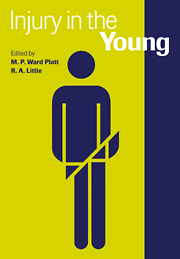Book contents
- Frontmatter
- Contents
- List of contributors
- Editors' Preface
- 1 The epidemiology of trauma involving children
- 2 Emergency room requirements for children
- 3 Child deaths in Accident and Emergency
- 4 Immediate life support
- 5 Evaluation of injury in children
- 6 Injuries of the developing brain
- 7 Wound healing in children
- 8 The lung after injury in children
- 9 Metabolic and endocrine stress responses to surgery
- 10 Head injury in children
- 11 Near drowning
- 12 The acute response to burn injury in children
- 13 Nutritional support of the severely burned child
- 14 Recovery, rehabilitation and the neuropsychological sequelae of head injury
- 15 Children's rights and child protection
- Index
15 - Children's rights and child protection
Published online by Cambridge University Press: 18 September 2009
- Frontmatter
- Contents
- List of contributors
- Editors' Preface
- 1 The epidemiology of trauma involving children
- 2 Emergency room requirements for children
- 3 Child deaths in Accident and Emergency
- 4 Immediate life support
- 5 Evaluation of injury in children
- 6 Injuries of the developing brain
- 7 Wound healing in children
- 8 The lung after injury in children
- 9 Metabolic and endocrine stress responses to surgery
- 10 Head injury in children
- 11 Near drowning
- 12 The acute response to burn injury in children
- 13 Nutritional support of the severely burned child
- 14 Recovery, rehabilitation and the neuropsychological sequelae of head injury
- 15 Children's rights and child protection
- Index
Summary
Introduction
Despite an avalanche of interest in and legislation concerning children's rights in the last decade and an increase in, and in the incidence of, child abuse, little of value has emerged concerning the acute problem of how to reconcile the increasing emphasis on and respect for children's rights with the increasing need to protect children from abuse.
There is the hint of a paradox here. For rights and protection are often incompatible. In so far as I have a right to do something, you are not entitled to prevent me from doing it or to protect me, against my will, from its harmful effects. Rights protect liberties. The two classic antilibertarian approaches to morality are essentially protectionist in character. They are paternalism and moralism. Paternalism claims the right to control the behaviour of another for that other's own good while moralism asserts that right to protect others from wickedness. The characteristic call of the paternalist is: ‘don't do that, it will harm you!’, that of the moralist is: ‘don't do that, its wicked!’.
If we are concerned about children's rights and hence concerned not only to protect children from abuse, but more importantly to deal justly and appropriately with them when their vulnerability is increased by the need for some form of health care, then we cannot ignore the question of whether they have a right to choose to refuse treatment which might, objectively considered, be clearly in their interests.
- Type
- Chapter
- Information
- Injury in the Young , pp. 300 - 311Publisher: Cambridge University PressPrint publication year: 1998



